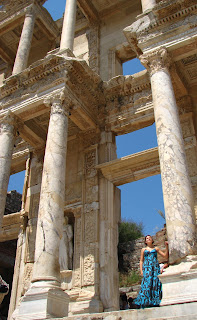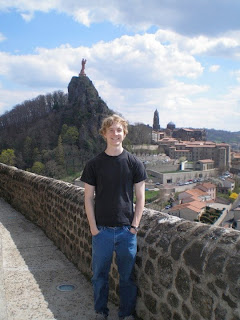...now known as Istanbul, Turkey. The following are passages from my first few days in this incredible city where I taught English for two months through AIESEC, had a fascinating cultural experience and built beautiful friendships.
April 26, 2009 – Arrival in Istanbul
Upon arrival, Sami, an AIESEC member picked me up from the airport and we took the shuttle back to the AIESEC Office. I can't believe how nice it is here. It's raining but the city is so green and alive, and I love the small streets and old buildings. It was surprising to see some of the same ads that we have in Canada (Lacoste, iPhone) and to see that so many things are similar - it's an interesting mix between old and new. Another thing that I found surprising is just how big the city is. It's HUGE!! Just taking the shuttle back all I could see were buildings and more buildings on many hills extending in very direction.
First culture shock: Taking the taxi to our flat. We were continuously winding through the small streets and missing other cars by inches, literally. It was terrifying.
I'm staying in an apartment with 5 other interns, and the first thing we did: get Baklava. On the way back I realized something else: Istanbul is so big, that when they say "it's close" they mean at least 1 or 2 kilometres. Our street is very busy and filled with little shops and fruit stand on both sides and our apartment is on the 6th floor of a building with a hidden entrance (nice view but imagine carrying up the suitcases with no elevators).
April 29, 2009 – Orientation Day at the School
I hear that in Turkish culture, time is a little bit more flexible (not such a bad thing for me). However, I was still surprised when we left the apartment 2 hours later than we had planned. Then we went (slowly and casually) to a nice little restaurant and got a traditional Turkish sandwich: spicy salami, pickles, melted cheese, and a few other things toasted to perfection.
We took the bus, then the ferry to the Asian side of Istanbul, crossing the Bosphorus. We passed so many diverse neighborhoods, each with very different architecture. The Ferry is quite big and it's going to be a very nice trip to take everyday, regardless of the its being an hour and a half both ways. I’ll have more of a chance to visit the city. We also saw a pair of dolphins on the way and the waters are filled with Jelly Fish.
When we got to Marla Language Academy (the school I work at), I met the teachers and the students. I went into each of the classes as an object of intense fascination for the students. Overcoming their shyness, and in broken English, they began to ask me questions like “what is your favourite football team? Why do you think will win EuroVision this year?” Euro-what? I had no idea what they were talking about. Despite my profound embarrassment, I think they forgave me. Leaving the school Sami and I walked along the Bosphorus while waiting for the ferry. What a view! Just looking across you can see the towers of Mosques scattered along the skyline among endless buildings.
Another culture shock: A woman dressed as a gypsy selling Roses and other flowers approached and harassed us. When I say harassed, I mean aggressively and rudely pursued and ‘persuaded’ us to buy a flower for at least 50 metres as we walked along and tried to brush her off. When I say she pursued ‘us’, I mean Sami, my AIESEC friend who is a guy and should have been a ‘gentleman’ and bought me one. When we finally got rid of her by giving her a Lira (Turkish money), another one approached us.
April 29, 2009 – First Day of Work, also known as the day of Murphy’s Law
Time to go to work alone. To start off the day, I got on the first bus and got off at the ferry. I lost the piece of paper with all of the information (which bus to take, which ferry, etc.) to get to work. Naturally, I started laughing… Working from memory I got to the other side, but I couldn't find the bus. The bus stations are crazy packed with people and have many, many platforms. It started raining (and it was cold and windy) and I was running from one platform to another.
By this time I was already late, and I didn't get on the right bus. There are two buses 3A and 3B. 3A goes directly to the school and 3B takes a rather large detour. I got on 3B. Finally I got to the school and I was already 40 minutes late and I missed my first class.
On the way back it continued to rain and I got soaked again. Wonderful. Then, I took the wrong bus, again. Then, I missed my stop and had to walk through a couple of dark and deserted alleys to get back to the right place, which is a bit difficult to discern by night… Finally, soaked and cold, I got home and my key didn't work. Oh boy! Luckily my roommates were home and it was over, woohoo!
Ah… the adventures of being in a new country.
Jessie McCahill is the Student Abroad Advisor at Laurier International. Read more from her adventures in Turkey in our next post.
 After work, a Turkish girl that I work with invited me over to her house, what a great experience! After we walked the “close” distance from the bus stop to her house, we were greeted by her entire, rather large, family.
After work, a Turkish girl that I work with invited me over to her house, what a great experience! After we walked the “close” distance from the bus stop to her house, we were greeted by her entire, rather large, family. 




